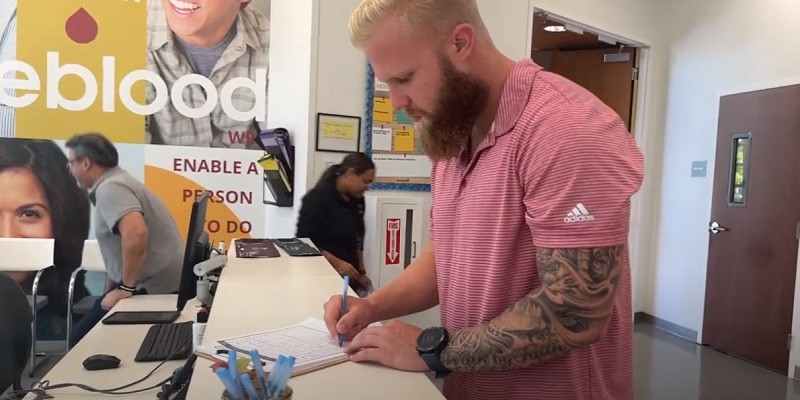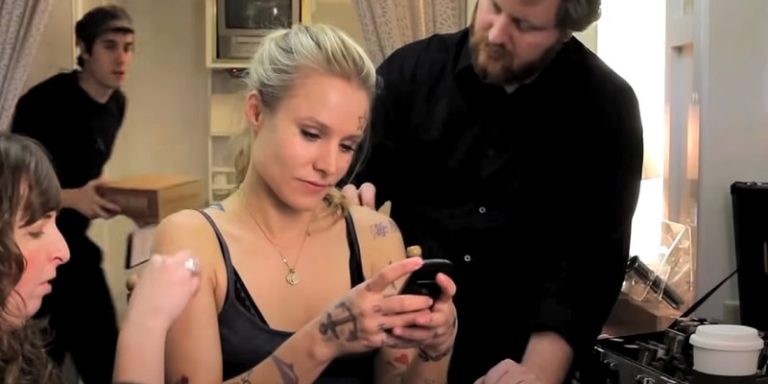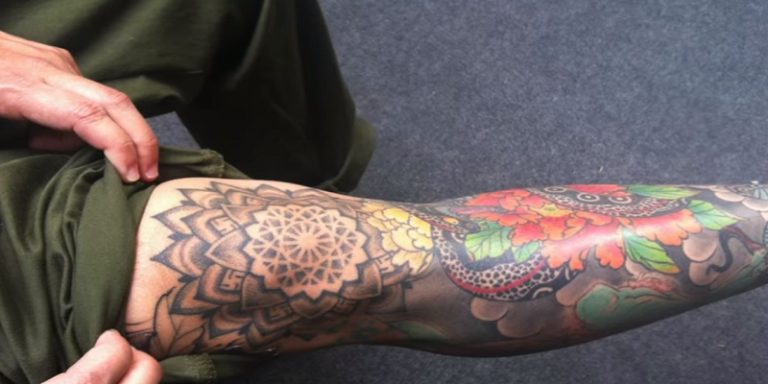Can You Donate Plasma If You Have Tattoos?
Last Updated on June 18, 2025 by Jaclyn A. Neeley
Yes, you can donate plasma even if you have tattoos. However, certain conditions and regulations may apply depending on the tattoo and where you got it.
Your eligibility to donate plasma will be determined based on specific criteria set by the plasma donation centers.
Tattoos And Plasma Donation
Plasma donation is a noble act that can save lives and make a positive impact in communities. However, if you have tattoos, you might be wondering if you are still eligible to donate plasma. In this article, we will explore the relationship between tattoos and plasma donation, with a focus on understanding plasma donation and the impact of tattoos on this process.
Plasma Donation
Plasma donation involves giving a part of your blood called plasma, which is used to produce essential medications for individuals with various medical conditions. This selfless act can provide life-saving treatments to people who rely on these medications.
When you donate plasma, a small amount of blood is drawn from your body, and the plasma is separated and collected. The remaining blood components are then returned to your body. This process usually takes about an hour, and the donated plasma is carefully tested and treated before being used for medical purposes.
Impact Of Tattoos On Plasma Donation
Tattoos, although a form of self-expression and art, raise a few concerns when it comes to donating plasma. The primary concern is related to the risk of bloodborne diseases such as hepatitis or HIV, which can be transmitted through contaminated needles. Tattooing involves the use of needles, and if proper precautions are not taken, there might be a risk of infection.
Due to this potential risk, some plasma donation centers have specific policies regarding tattoos. In general, these centers require donors to wait for a certain period of time after getting a tattoo before they can donate plasma. The waiting period can vary depending on the center and country regulations.
To safeguard the health of both donors and recipients, plasma donation centers prioritize the safety of the donation process. This includes ensuring that donors have followed proper aftercare procedures, such as keeping the tattoo clean and allowing it to heal completely before donating plasma. It is important to note that these policies are put in place to minimize any potential risks.
If you have recently gotten a tattoo and want to contribute through plasma donation, it is crucial to check with your local plasma donation center about their specific guidelines. They will provide you with accurate information about the waiting period necessary before you can donate plasma.
Eligibility Criteria
When it comes to donating plasma, there are certain eligibility criteria that individuals must meet in order to ensure the safety of both donors and recipients. These criteria include general requirements for plasma donation as well as specific requirements related to tattoos.
General Requirements For Plasma Donation
Before delving into the specific requirements related to tattoos, let’s first discuss the general requirements for plasma donation. These criteria are applicable to all potential donors, regardless of whether they have tattoos or not.
Here are the general requirements:
- Aged between 18 and 65 years old
- Weigh at least 110 pounds (50 kilograms)
- In good health condition
- Not pregnant or breastfeeding
- Have valid identification
Specific Requirements Related To Tattoos
Now, let’s focus on the specific requirements related to tattoos. It’s important to note that having tattoos does not automatically disqualify you from donating plasma. However, there are certain precautions and guidelines that plasma donation centers follow to ensure safety and minimize potential risks.
Here are the specific requirements:
- Tattoos must be fully healed
- No tattooing or piercing within the past 12 months
- No recently acquired tattoos from unregulated sources
- No tattoos done in non-sterile environments or by non-professionals
Tattoos that have completely healed indicate minimal risk of infection or complications during the plasma donation process. Additionally, the requirement of no recent tattooing or piercing within the past 12 months helps ensure that the donor’s immune system has had enough time to recover.
All tattoos acquired should be from regulated and professional tattoo parlors that adhere to strict hygiene practices. This requirement helps prevent the transmission of bloodborne diseases, such as hepatitis, HIV, and other infections.
If you meet the specific requirements related to tattoos and the general requirements for plasma donation, you may still be eligible to donate plasma and contribute to life-saving treatments and therapies.
Tattoo And Piercing Regulations
If you have tattoos, you may still be able to donate plasma, as eligibility varies by donation center. It’s important to check with your local center to understand their specific requirements regarding tattoos and piercings.
When it comes to donating plasma, it’s important to be aware of the various regulations surrounding tattoos and piercings. While having body art or piercings does not necessarily disqualify you from being a plasma donor, there are certain health and eligibility guidelines that must be followed.
Health Regulations For Tattoos And Piercings
If you have tattoos or piercings, you might be wondering how they can impact your ability to donate plasma. Health regulations exist primarily to ensure the safety and well-being of both donors and recipients. These regulations aim to prevent the spread of infectious diseases and maintain the purity of the donated plasma.
During the tattooing or piercing process, there is a risk of exposure to certain bloodborne pathogens such as hepatitis and HIV. To mitigate this risk, professional tattoo and piercing establishments are required to adhere to strict health and safety standards. These standards include using sterilized equipment, single-use needles, and maintaining a clean environment.
If you have recently undergone a tattoo or piercing procedure, it is crucial to wait until the healing process is complete before attempting to donate plasma. The healing time can vary depending on the size and location of the tattoo or piercing, but it typically ranges from a few weeks to a few months.
Impact On Plasma Donation Eligibility
Having tattoos or piercings does not automatically disqualify you from donating plasma. However, certain factors related to your body art or piercings may affect your eligibility. One such consideration is the location of the tattoo or piercing.
If your tattoo or piercing is in an area that commonly comes into contact with donation equipment, it may prevent you from donating plasma temporarily. For example, if your tattoo is on your inner arm where the phlebotomist inserts the needle, it could interfere with the donation process. In such cases, it’s best to wait until the tattoo has fully healed and does not pose any risks.
An important aspect to keep in mind is that plasma donation centers have specific guidelines regarding tattoos and piercings. It’s crucial to check with your local donation center for their specific requirements and policies. Some centers may have more restrictive guidelines, while others may be more lenient.
In summary, while having tattoos or piercings may not automatically disqualify you from donating plasma, it’s essential to follow the health regulations and guidelines set by your local donation center. Make sure to consult with the center to understand their specific requirements and any temporary restrictions related to your body art or piercings.
Preparation And Procedure
Before donating plasma, there are a few important steps you need to take to ensure a successful and safe donation process. These steps involve preparing yourself both mentally and physically, as well as understanding what to expect during the actual donation. In this section, we will discuss how to prepare for a plasma donation and walk you through the donation process.
Preparing For A Plasma Donation
Preparing for a plasma donation begins with making sure you meet the eligibility criteria set by the donation center. While having tattoos does not automatically disqualify you from donating plasma, it’s important to ensure that your tattoos adhere to certain guidelines.
First and foremost, your tattoo should be fully healed, meaning it has completed the normal healing process and your skin has completely regenerated. This typically takes about four to six weeks, but can vary depending on the individual. If you have recently gotten a tattoo, it’s crucial to wait until it is fully healed before donating plasma.
Additionally, it is important to disclose any information about the tattoo to the donation center. This includes details about where and when you got the tattoo, as well as any concerns you may have regarding its safety or cleanliness. Being transparent about your tattoos allows the donation center to assess whether it poses any potential risk to you or the plasma recipients.
What To Expect During The Donation Process
- Upon arriving at the donation center, you will be asked to provide identification and complete a questionnaire about your medical history and lifestyle habits. This information helps the center determine your eligibility to donate plasma.
- Once you have completed the necessary paperwork, a staff member will perform a basic physical assessment, which may include measuring your temperature, pulse, and blood pressure. This is done to ensure that you are in good health and suitable for donation.
- Next, one of your veins will be accessed using a sterile needle, and the plasma will be separated from your blood using a machine called a plasmapheresis device. This process usually takes about an hour or so, depending on the amount of plasma being collected.
- During the donation, you may experience a mild sensation of coldness due to the saline solution used in the plasmapheresis device. You may also feel some tingling or numbness in your fingers or lips. These sensations are temporary and should subside shortly after the donation is complete.
- After the plasma has been collected, the red blood cells and other components will be returned to your body, ensuring that you do not experience any significant loss of blood.
- Once the donation is finished, you will be given time to rest and recover. It’s important to stay hydrated and eat a balanced meal after the donation to replenish your fluids and nutrients.
By understanding the preparation and procedure involved in donating plasma, you can be better prepared for the experience. Remember to always follow the guidelines set by the donation center and communicate openly about your tattoos to ensure a safe and successful donation.
Safety And Hygiene
Wondering if you can donate plasma with tattoos? Safety and hygiene measures are important in the plasma donation process, but having tattoos generally doesn’t disqualify you. As long as your tattoo is healed and meets certain requirements, you may still be eligible to donate plasma and help others in need.
Ensuring Donor Safety During Plasma Donation
When it comes to plasma donation, ensuring donor safety is of utmost importance. Donating plasma can be a life-saving act, but it is crucial that the process is carried out in a safe and hygienic manner. Medical professionals and donation centers take several precautions to minimize any risks associated with the procedure.
Importance Of Hygiene And Sterilization
Hygiene and sterilization are paramount when it comes to plasma donation. Donors need to have peace of mind knowing that the equipment used during the process is clean, and there are no chances of cross-contamination or infection. The donation centers strictly adhere to high standards of cleanliness and follow stringent procedures to maintain hygiene.
Medical personnel at plasma donation centers undergo thorough training to ensure they are well-versed in maintaining cleanliness and practicing proper sterilization techniques. Donors can rest assured that every step is taken to minimize any risks.
Proper Handling And Disposal Of Needles And Equipment
One crucial aspect of maintaining hygiene during plasma donation is the proper handling and disposal of needles and equipment. Donation centers strictly adhere to industry protocols and guidelines for the safe disposal of used needles and equipment. All materials used undergo thorough sterilization processes to eliminate any chances of contamination.
Donors can have peace of mind knowing that the disposal of all needle-related items follows strict medical standards. The use of single-use sterile needles eliminates the risk of any bloodborne infections, providing an added layer of safety.
Strict Adherence To Fda Guidelines
Medical professionals and plasma donation centers strictly adhere to the guidelines established by the FDA. These guidelines lay out the protocols and safety measures that must be followed to ensure donor safety during plasma donation. The FDA regulations cover aspects such as equipment sterilization, screening procedures, and maintaining cleanliness, among others.
The Role Of Donors In Ensuring Safety
While donation centers take every precaution to maintain safety and hygiene, donors also play a vital role in the process. Providing accurate medical information during the screening process is crucial, as it helps identify any potential risks or contraindications.
Donors with tattoos must disclose this information during the screening process, allowing the medical professionals to assess the situation and make an informed decision. By being transparent about tattoos, donors ensure that the process can be carried out safely and without any complications.
So, if you have tattoos, you can still donate plasma as long as you follow the guidelines set by the donation centers and provide accurate information during the screening process. Safety and hygiene are paramount, and proper procedures are in place to protect both donors and recipients. Your act of plasma donation can make a significant impact, saving lives and making a difference in the world.
Frequently Asked Questions For Can You Donate Plasma If You Have Tattoos?
Can You Donate Plasma If You Have Tattoos?
Yes, you can donate plasma if you have tattoos as long as they were done with sterile, single-use equipment and are fully healed.
How Long After Getting A Tattoo Can You Donate Plasma?
After getting a tattoo, you can donate plasma once it is fully healed, which usually takes about 12 months.
Are There Any Restrictions On Donating Plasma With Tattoos?
There are no specific restrictions on donating plasma with tattoos as long as they meet safety and hygiene standards.
Do All Plasma Donation Centers Accept Donors With Tattoos?
Not all plasma donation centers accept donors with tattoos. It’s best to check with the specific center’s guidelines before donating.
Is There A Risk Of Infection When Donating Plasma With Tattoos?
When donating plasma with tattoos, there is a minimal risk of infection if the tattoo is fully healed and meets hygiene standards.
Conclusion
To sum it up, having tattoos does not automatically disqualify you from donating plasma. The guidelines may vary from one donation center to another, but as long as your tattoos are healed and meet certain requirements, you can still make a positive impact by donating plasma.
So, if you’re looking to contribute to a good cause, don’t let your tattoos hold you back from giving back to those in need.







